A new pre-print study from Norway looking at differences in outcomes between vaccinated and unvaccinated hospital patients has found that being vaccinated makes zero difference to the risk of dying once hospitalised for COVID-19.
“There was no difference in the adjusted odds of in-hospital death between vaccinated and unvaccinated patients in any age group,” the researchers write. They also observed no difference between vaccinated and unvaccinated in the length of hospital stay for patients not admitted to ICU. These findings are adjusted for age and other risk factors so are not simply due to the vaccinated being older or at higher risk (though, as always, the validity of the adjustments may be questioned). The findings also only include patients admitted primarily due to Covid, so aren’t confounded by patients admitted for other reasons who also tested positive at some point.
The researchers did however find that vaccinated patients aged 18-79 had “43% lower odds of ICU admission” and an estimated 26% shorter hospital stay than unvaccinated patients.
It is curious that vaccinated patients were 43% less likely to need ICU but no less likely to die. Did the antibodies from the vaccines just mean that those who were going to fight it off did so a bit more quickly and easily, but the vaccine antibodies weren’t actually able to save anyone who wasn’t going to survive anyway? That appears to be the researchers’ conclusion:
Our results suggest that once hospitalised the risk of death among vaccinated and unvaccinated patients in Norway is similar. However, for survivors the disease trajectory is milder in vaccinated patients, with reduced need for hospital care and organ support.
The study didn’t examine what difference vaccination might make to the risk of being admitted to hospital in the first place, as it was a hospital-based study. This means vaccination may reduce one’s risk of needing to go to hospital (and thus the overall risk of death), even if it doesn’t reduce the risk of dying once admitted.
The study covered all patients in Norway admitted to hospital primarily due to Covid between February 1st and September 30th 2021, though made various exclusions (including 154 who tested positive within 21 days of their first dose, which is a shame as more analysis needs to be done on such cases). It included 2,361 patients, 70 of whom (3%) were partially vaccinated and 183 (8%) of whom were fully vaccinated. Almost all had the Pfizer vaccine. Over the study period, 421 of the patients (18%) had been admitted to ICU. At the end of the study period 18 patients (0.8%) were still in hospital, while of the 2,343 patients discharged, 107 died in hospital (4.6%).
The percentage vaccinated seems at first glance to be very low at 8%, particularly as the study states that 84% of Norwegian adults were double vaccinated by the end of September. However, the figure makes more sense when you look at when Covid hospital admissions in Norway occurred during the study period: of the 2,775 total Covid hospital admissions during the period, 1,742 (63%) occurred before May 2nd, at which point just 7% of Norwegian adults were vaccinated.
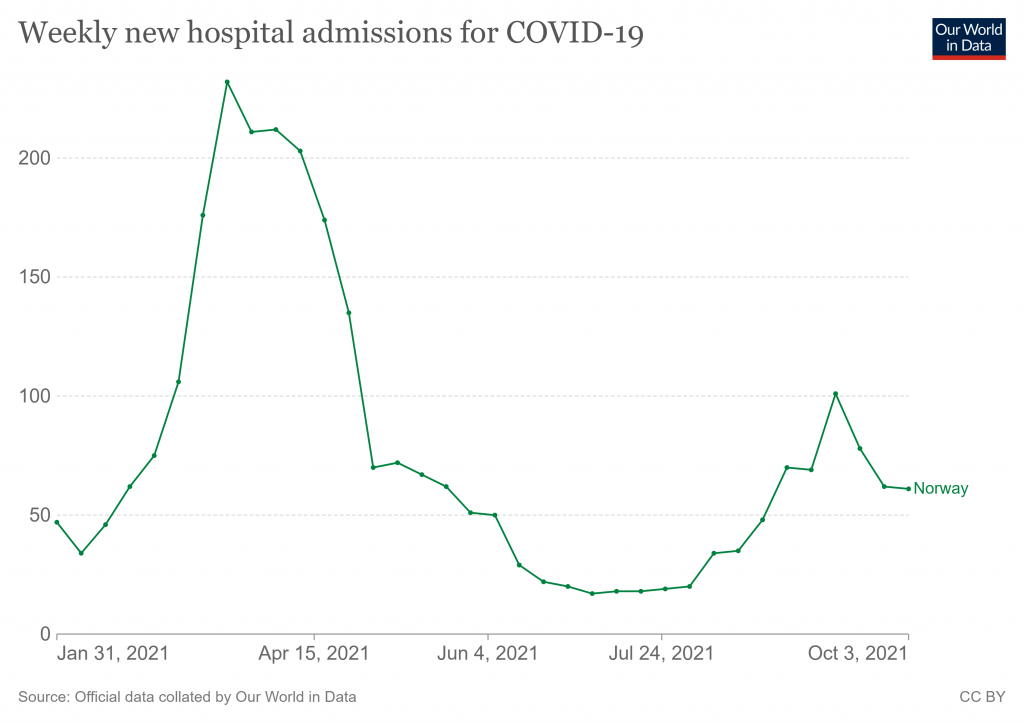
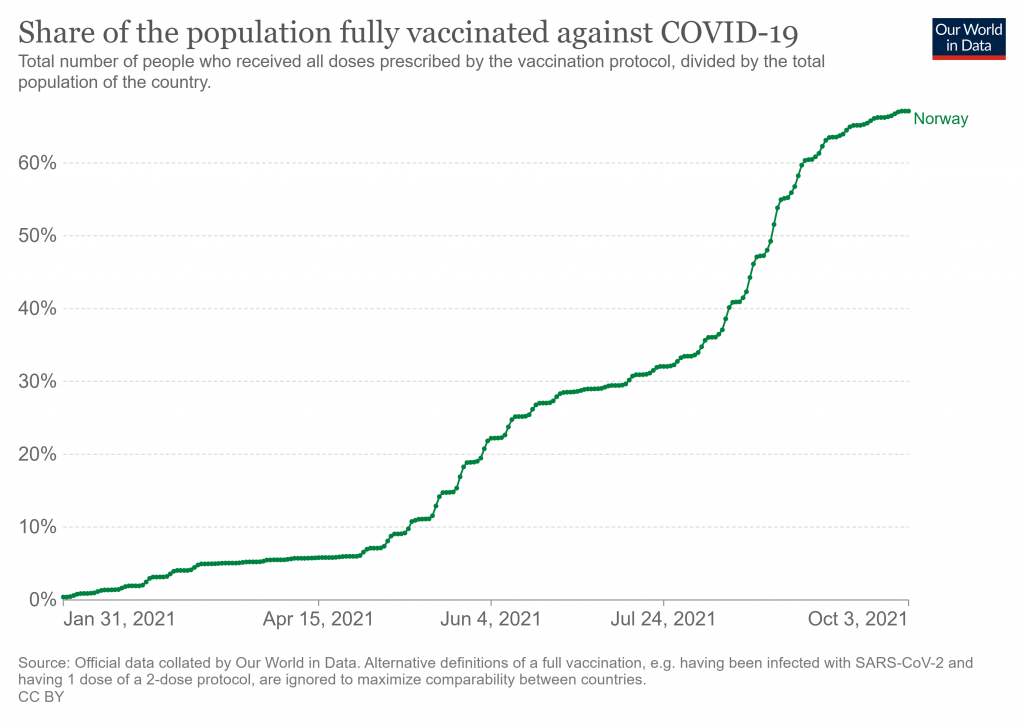
In fact, the study tells us when people were admitted by vaccination status, as per the following table.
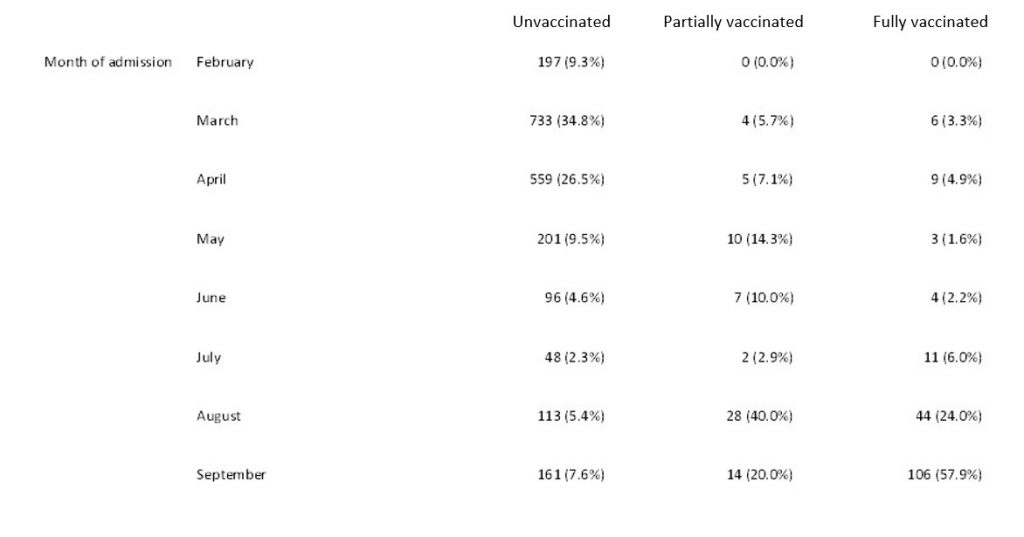
Note that 58% of the double vaccinated were admitted just in September, and 82% once you add August in as well, leaving only 18% admitted prior to the Delta surge. Is there a waning effect at work, then? Perhaps, though the authors don’t suggest so. In fact, they decline to include a chart showing how the risk of in-hospital death changed over time, explaining: “Date of admission was not associated with death in hospital in our multivariable model.” This suggests the trend was flat, rather than declining.
The study is unusual in finding zero vaccine effectiveness against in-hospital death for the whole period of the vaccination programme. A recent study in neighbouring Sweden found vaccine effectiveness against severe disease declining over the course of seven months to be low, zero or even negative in risk groups such as men, older frail people and people with comorbidities (see below; there were no separate findings on death). But this is one of the first major studies to find an important measure of vaccine effectiveness – in-hospital mortality – to be negligible overall.
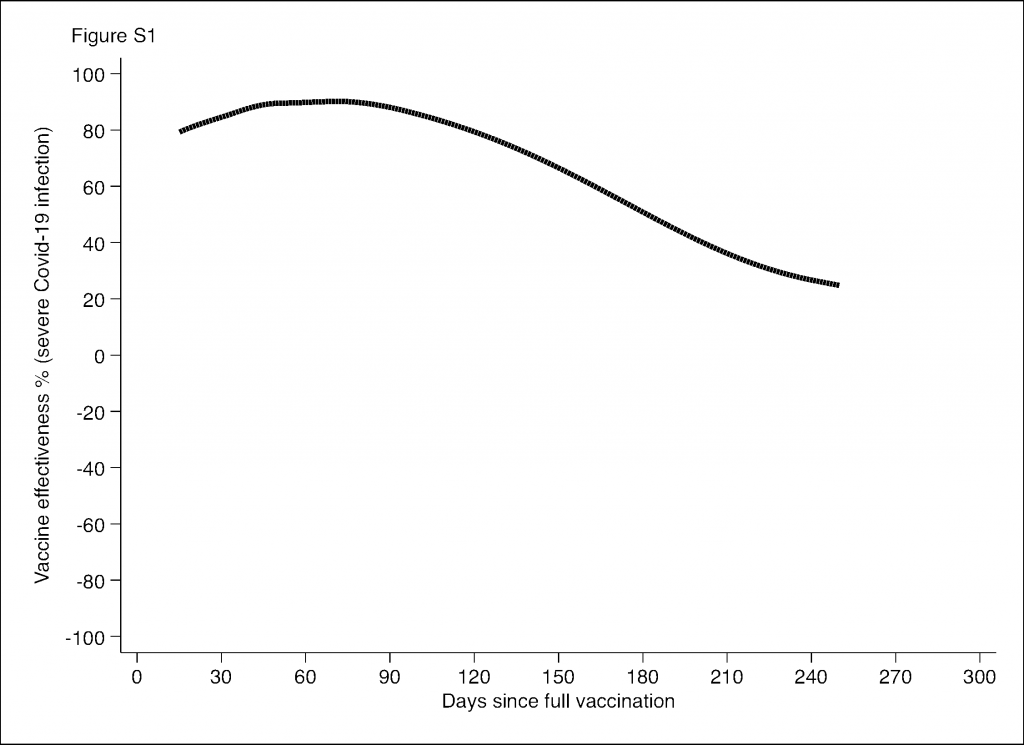
It’s probably worth recalling at this point that Norway is an outlier generally in the pandemic so far, with one of Europe’s lowest Covid death rates and, incredibly, zero excess mortality during the pandemic.
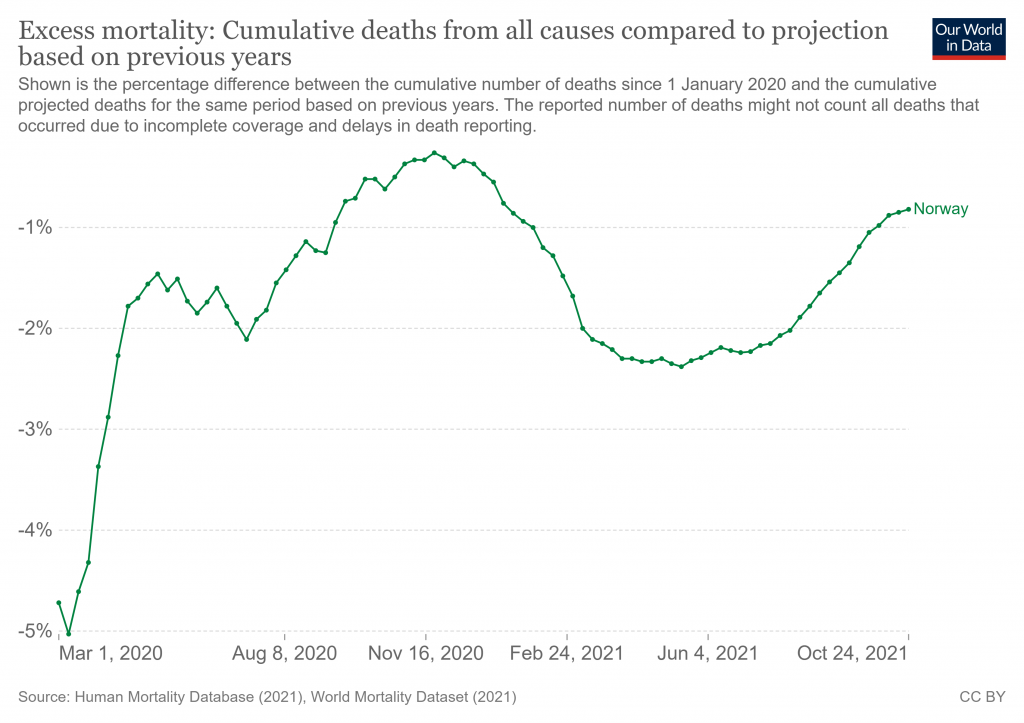
Does this affect how generalisable the results of the study are to other countries?
Similarly, Sweden is also unusual in having been left largely unscathed so far by the Delta variant that has caused new surges in most countries.
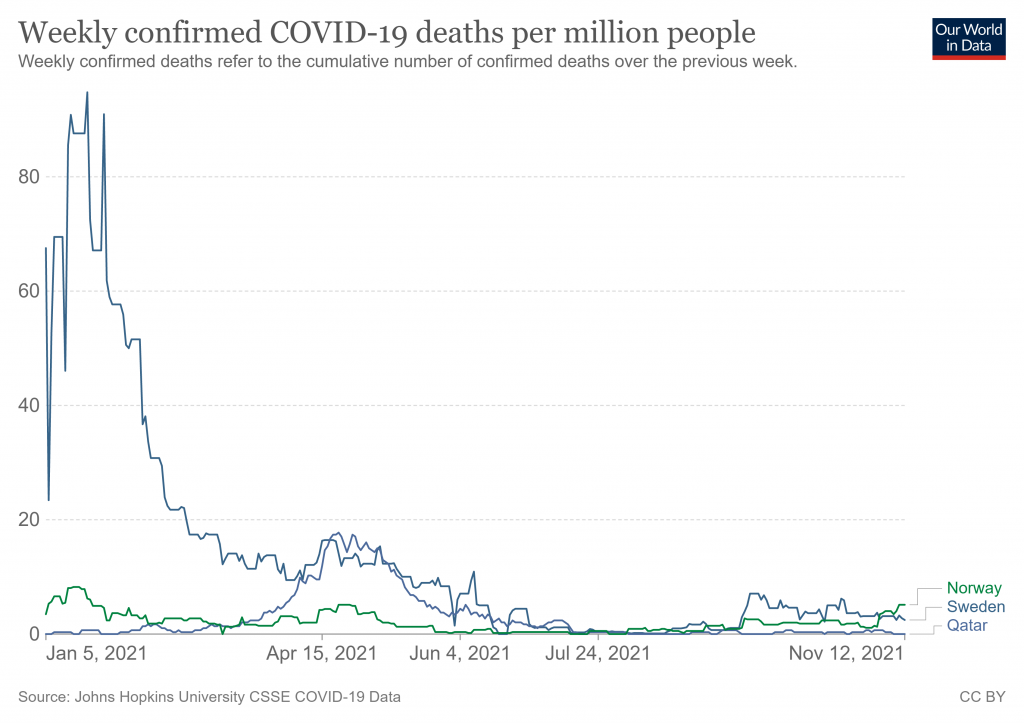
Qatar, too – another country where a recent study has found sharply declining vaccine effectiveness against infection – has seen very little impact from Covid in 2021. In this case the study found effectiveness against serious disease generally held up, though less so among those over 60.
Is there some connection between this low impact of Covid in 2021 in these countries and the vaccine effectiveness results showing declining or zero efficacy against serious disease and death? Something worth looking into, I’d suggest.















To join in with the discussion please make a donation to The Daily Sceptic.
Profanity and abuse will be removed and may lead to a permanent ban.
Hope it’s not said today that the people on the memorials died for our freedom
An assertion that is patently untrue
It will be said. By weak-kneed, fluff-brained, muzzled, cowardly muppets.
That’s why I am boycotting everything to do with ‘remembrance’. It’s a studied insult to those who suffered and died for freedom.
I think we need to distinguish two things here.
Some members of our prayer group will be holding a sort of remembrance service later this morning and these point will be raised.
I agonised long and hard as to how to phrase these prayers and my first attempt was not right; my mind is clearer now.
Yes, it’s one thing to remember in the sense of simply bringing to mind, and another to do so in the sense of applying what has happened in the past to what is happening today. And much of this is about understanding the psychology rather than the historical events.
AVG says this link is to a phishing site, so don’t be tempted to click on it.
Bad enough the insult to humanity perpetrated by those who engineered the world wars. Remembrance day is however not about them nor in support of them, but for the victims who went to war and gave their lives for what they, no different from yourself, believed was right and good.
Please do not continue to regard those who gave up and risked everything for the sakes of others.
I was ringing for the service today and the muffle on my bell (which is anecdotally known as “Moriarty’s bell – name of 22 yr old vicar’s son who died in the WW1) went awry and had to be adjusted. I commented that Moriarty was complaining that he died for our freedoms which we have given up forever for a virus. No comment from other ringers.
It seems to be the same in the UK!
This data comes straight from the HSA week 45 Vaccine Surveillance Reporthttps://assets.publishing.service.gov.uk/government/uploads/system/uploads/attachment_data/file/1032859/Vaccine_surveillance_report_-_week_45.pdf
Not only does it show that the vaccinated over 40 are 100% more likely to test positive but it also shows (see tables 4 & 5 page 19 & 20) that the death outcomes for both the vaxxed & unvaxxed are about the same. In the over 80 group, the 30-39 group & U18’s the vaccinated who end up in hospital are more likely to die than the unvaccinated.
Just a note to table above. I’m amazed at the likelihood of death following overnight hospital admission in the older age groups, again, it looks like a nosocomial issue with the very old & the very young. I’d appreciate it if someone else could look at the data & verify this, bit of a rush this morning but having read the article on Norway I thought I should do a back of a fag packet on the UK & set the ball rolling.
Not necessarily.
Even prior to covid, we had moved to a world where all death was unacceptable and terrifying.
As elderly people deteriorate in the final illness, it’s very common for family, carers or nursing homes to panic and call an ambulance.
The person then dies in hospital.
Whilst I do agree that nosocomial infection is common and that hospitals are not 100% places of calm, healing and optimal treatment, cultural behaviours and actions mean that the data is not “pure” in terms of drawing conclusions.
Is it not because they are all emergency admissions for stroke and aneurysm (‘vax’ induced) but none of them make it?
Is this not a artefact from the daft policy of counting any death within 28 days of a positive covid test as a covid death?
Given this is who guidance so assume Norway are using this method the same as us. In which case this result would be obvious.
No, that’s apparently not the case:
My gut is that delta just isn’t as lethal as previous strains.
In addition, by telling people they won’t die or need hospitalisation when they are vaccinated, we remove a lot of the psychological burden and panic that they had prior to the vaccine. I think this means that they cope better with the breathlessness and cough. It also means that they don’t turn up in hospital unnecessarily, spreading covid to actual vulnerable people.
Obviously we also manage those who do get admitted to hospital much better.
Your gut feeling must have studied 101 virology – viruses replicate to spread faster and be less potent so they do not kill their host – it’s called evolution and is fairly well known in scientific circles.
However, it took about a year for delta to show up, after the main wu strain and a couple of minor variants in the interim. We’ve now had delta for a year but it doesn’t seem to be evolving into another dominant variant. I think there’s something fishy going on there.
I had understood that there have already been thousands of variants, even before Kent and South Africa etc came along. We are just only told about the ones they want us to be afraid of
At any rate, it took about a year for them to tell us about Delta, which doesn’t mean it hadn’t already shown up.
We’re being spoon fed information as an when they see fit.
I’m surprised that Whitty hasn’t disbanded the JCVI for not giving him the answer he sought on vaxxing kids.
Even Delta is a ‘minor variant’. It just happened to be the one the Nudge unit chose to demonise. None of the current variants are even close to 1% different from the original. Remember SARS Cov-1 and -2 are around 20% different and acquired immunity from -1 apparently works against -2 17 years later. Variant Schmariant.
“In addition, by telling people they won’t die or need hospitalisation when they are vaccinated, we remove a lot of the psychological burden and panic that they had prior to the vaccine. “
Of course, that effect could have been achieved far more easily by not intentionally spreading fear and panic over an objectively not particularly devastating disease (in societal terms). And any additional placebo effect could also have been achieved by backing drugs such as ivermectin and hydroxychoroquine for early treatment.
Ivermectin is not a placebo. It actually works.
“My gut is that delta just isn’t as lethal as previous strains.”
That is highly likely – a major confounding variable.
But, beneath it all, we have to keep in mind that being hospitalized and dying from this virus are very rare events, anyway.
Can anyone here please explain something to me regarding natural immunity as i cant seem to find the answer online? My wife did an antigen blood test in May of this year shortly after being a bit sick with “a virus”. The results came back saying they are consistent with SARS COV 2 infection or immunisation. Her level was 45 U/ML. She’s just done the same test again and the results have changed to 520 U/ML. Can someone help me with the reasons for the change over 6 months? The test used is a ROCHE Elecsys (if that helps).
My speculation is that she may have very recently fought off a different variant without feeling more than a little tired… her body responded with a big increase in antibodies. With natural immunity the virus still enters, it’s just it gets defeated and your immunity is topped up.
This would be the Norway that insists on being ‘fully vaccinated’ to enter the country? And the Norway broadcasting more propaganda about ‘cases rising’ and “put your face masks back on!”, and mandating the ‘vaccines’ for the workplace?
The Norwegian authorities and those who did this study being completely different bodies, why would that surprise you?
Is anybody surprised?
Not those who have been follwing the progress of the Gene Therapy jabs, no.
And yet the BBC had an article today banging on about the “unvaccinated” are far more likely to die than the “vaccinated”.
https://www.bbc.co.uk/news/health-59260294
The BBC is the propaganda arm of the government and Big Pharma and are very good at persuading the masses to take their medicine, keel over and increase Big Pharma’s profits.
Is it possible that zero effectiveness after hospitalisation is a sign that something untoward is happening in hospitals? I’m not suggesting anything deliberate on the part of doctors and nurses but perhaps current authorised treatment regimes are not effective.
“The researchers did however find that vaccinated patients aged 18-79 had “43% lower odds of ICU admission” – the study is not blinded so there might be policy reasons for this statistic, such as isolating those dangerous unvaxxed; it wouldn’t be the first time that unvaccinated patients were treated differently. The issue of selective ICU admission was brought up in NICE’s notorious response to the Spanish calcifediol study that had showed such a spectacular effect on hospitalised patients.
In the US they want to stop testing asymptomatic vaccinated patients, to get their pandemic of the unvaccinated
…that vaccine!
We know, the raw UKHSA data shows it.
“once hospitalised”
I don’t understand why we’d expect any different.
In the photo at top of this article, did anyone notice that huge syringe reflecting into the harbour water?
Higher odds of admission to ICU for unvaccinated (but not more likely to die) is because healthcare staff is more “careful” with the unvaccinated. But as the death odds show, the carefulness is an overreaction.
Is this another exercise in ‘spot the weaselly words and non-sequiturs’ among this forest of data? I think I may have one:
“The study covered all patients in Norway admitted to hospital primarily due to Covid between February 1st and September 30th 2021, though made various exclusions (including 154 who tested positive within 21 days of their first dose, which is a shame as more analysis needs to be done on such cases). It included 2,361 patients, 70 of whom (3%) were partially vaccinated and 183 (8%) of whom were fully vaccinated.”
Does this mean that 89% of those admitted to hospital (in the study?) were unvaccinated? Discuss.
They test for the flu since they’ve never isolated Covid-19. Which makes me wonder how they can tell there is a delta variant. They never isolated the virus but they use a test to show the damage of a solution does on monkey kidney cells then show the cellular debris as proof of the virus. So, they can use this method to claim an UNENDING! amount of variants. A lot of cancers and “viruses” are probably just different forms of parasites. Since the tests can’t differentiate between cold and flu and covid then doesn’t that mean ivermectin cures both the cold and the flu? Welcome to “they’ve been lying to us our entire lives about everything”. Get your Ivermectin while you still can! https://ivmpharmacy.com
https://www.nysenate.gov/legislation/bills/2021/a416
Seen this? Suspected contacts carriers cases can be rounded up and detained.
https://twitter.com/dempz8/status/1459640733498060808?s=21
Have a little listen Twitter and share it around. Watch this happen if we don’t wake up. Catherine A. Fitts on the vax pass and centralised control of all assets and taxation.
What it means to have a Covid jab – never been used in humans before, never been tested in lab animals, not known what the outcome will be, not responsible for whatever it does, your health and financial issues your problem, once in can’t take out, might kill you sooner or later, possibly give you life threatening injuries which will kill you eventually and it lasts for 2-6 months and then you have to have booster shots, for as long as it lets you live and it took a couple of hours to design on a home computer AND you are ordered to take it, bullied, threatened and isolated by your government if you don’t AND you have a cure for all viruses and Covid, which works 100% and it has not killed or injured anyone, over the past 27 years and you can’t ever get Covid or viruses, anything, because that is a physical impossibility AND it is the only way to stop the pandemic dead, for free!!
Covid Crusher: Mix one heaped teaspoon of Iodine table or sea salt in a mug of warm clean water, cup a hand and sniff or snort the entire mugful up your nose, spitting out anything which comes down into your mouth. If sore, then you have a virus, so continue morning noon and night, or more often if you want, until the soreness goes away (2-3 minutes) then blow out your nose and flush away, washing your hands afterwards, until when you do my simple cure, you don’t have any soreness at all, when you flush – job done. Also swallow a couple of mouthfuls of salt water and if you have burning in your lungs, salt killing virus and pneumonia there too.
Would You? Have You?
Richard
“Covid” is never going to go away, new variants will occur every 5 weeks or so, until eventually it dominates all – R.30 the latest one, does that – unless you follow my advice: What it means to have a Covid jab – never been used in humans before, never been tested in lab animals, not known what the outcome will be, not responsible for whatever it does, your health and financial issues your problem, once in can’t take out, might kill you sooner or later, possibly give you life threatening injuries which will kill you eventually and it lasts for 2-6 months and then you have to have booster shots, for as long as it lets you live and it took a couple of hours to design on a home computer AND you are ordered to take it, bullied, threatened and isolated by your government if you don’t AND you have a cure for all viruses, which is free and costs nothing to do, which works 100% and it has not killed or injured anyone, over the past 27 years I/We have been doing it and you can’t ever get Covid or viruses, anything, because that is a physical impossibility AND it is the only way to stop the pandemic dead, for free!!
Covid Crusher: Mix one heaped teaspoon of Iodine table or sea salt in a mug of warm clean water, cup a hand and sniff or snort the entire mugful up your nose, spitting out anything which comes down into your mouth. If sore, then you have a virus, so continue morning noon and night, or more often if you want, until the soreness goes away (2-3 minutes) then blow out your nose and flush away, washing your hands afterwards, until when you do my simple cure, you don’t have any soreness at all, when you flush – job done. Also swallow a couple of mouthfuls of salt water and if you have burning in your lungs, salt killing virus and pneumonia there too.
Would You? Have You?
Richard
Has anyone reading here run across the work of Grant Genereux?
The following is not archived in any one location unfortunately, so I’ll just drop it here.
It seems to me that this hypothetical but likely undisclosed Adjuvant confounds every study and every number we have encountered since this thing began, if indeed it is presently in use in these inoculations. A top-notch independent lab should be able to prove or disprove this hypothesis in a matter of days.
https://www.ncbi.nlm.nih.gov/pmc/articles/PMC3147979/
XXXX >>> RETINOIC ACID studied as a VACCINE ADJUVANT <<< XXXX
Enhances CD8+ T Cell Response and Mucosal Protection from Viral Challenge
Not recruiting status and the unmet dates lead to a few questions.
It is clear they want to use Retinoic Acid and its isomers as “Covid” TREATMENT
https://clinicaltrials.gov/ct2/show/NCT04353180
https://clinicaltrials.gov/ct2/show/NCT04730895
https://clinicaltrials.gov/ct2/show/NCT04396067
Storage requirements for Pharmaceutical Grade RETINOIC ACID:
XXXX >> Stored in the dark, -20C or -70C << XXXX
https://www.sigmaaldrich.com/content/dam/sigma-aldrich/docs/Sigma/Product_Information_Sheet/1/r2625pis.pdf
https://www.fda.gov/media/144414/download
Pfizer covid vaccine ingredient list
Pfizer vaccine must be stored at -70C
https://www.fda.gov/media/144638/download
Moderna covid vaccine ingredient list
Moderna vaccine must be stored at -20C
Both vaccines are recommended to stay
in their original carton/container
to protect them from light.
XXXX >>> As is RETINOIC ACID <<< XXXX
Retinoic Acid Inducing COVID Antibodies Better than a Vaccine
https://clinicaltrials.gov/ct2/show/NCT04396067
Nano-encapsulated RETINOIC ACID as a safe tolerogenic ADJUVANT
for intranasal vaccination against cutaneous leishmaniasis
https://pubmed.ncbi.nlm.nih.gov/31133469/
RETINOIC ACID-Loaded Poly (lactic-co-glycolic acid) Nanoparticle Formulation of ApoB-100-Derived Peptide 210 Attenuates Atherosclerosis
https://pubmed.ncbi.nlm.nih.gov/32970979/
Non-Viral COVID-19 Vaccine Delivery Systems
“Poly (lactic-co-glycolic acid) (PLGA) polymer has also been incorporated into a lipid mRNA delivery system, called TT3-LLNs, for mRNA delivery in human cell lines [ 41 ].”
https://www.sciencedirect.com/science/article/abs/pii/S0169409X20302799
https://benklesc.medium.com/the-mrna-pfizer-covid19-announcement-marks-a-new-era-of-cleaner-and-preservative-free-vaccines-d82bea123954
“The Pfizer COVID19 vaccine is SELF-ADJUVANTING, which means that it requires no immune booster and it is not incubated in an egg so it requires no antibiotics or formaldehyde to kill off harmful pathogens.”
Additional comments from Grant:
The mRNA vaccines are claimed to be “self-adjuvanting”.
Many of the adverse events are happening way too fast
to be from the spike protein response alone. Many reactions are like within 10-15 minutes. I suspect these cases are where the injection has hit a blood vessel and the dose directly enters the bloodstream.
The Janssen vaccines lists cyclodextrin as an ingredient.
Cyclodextrin is used as a delivery agent for RETINOIC ACID.
Many of the “side-effects” are close matches for RETINOIC ACID poisoning.
Please see the MDS sheet linked below to
understand the well-known toxicity of RETINOIC ACID.
https://datasheets.scbt.com/sc-205568.pdf
But, even with that, RETINOIC ACID is still widely used as an acne drug, and for chemotherapy.
Here’s a decent list of the side-effects:
Please take note of the huge spectrum of disorders, affecting almost every organ / tissue and cross-reference with the more commonly reported vac-side-effects,
https://www.webmd.com/drugs/2/drug-6661/accutane-oral/details/list-sideeffects
The companies / government would not have been able to disclose the RETINOIC ACID ADJUVANT as it would have ruled out the use of the vaccines in about 1/3 of the population. This is because RETINOIC ACID can’t be given to women of childbearing age (and for a rather long list of other conditions it is contraindicated for) It especially can’t EVER be given to pregnant women. RA is as toxic to the human fetus as is Thalidomide. This would surely explain the miscarriages, etc. that are being reported.
h/t Grant Genereux
@ggenereux.blog
author of Poisoning for Profits
I can explain the apparent anomaly. Patients who are vaccinated are turned away or released from hospital “because they are protected”. Unvaccinated are admitted, when perhaps they would recover without treatment.
Does a long post here go to a spam-folder? I previously posted a number of links referring to Grant Genereux’s work deciphering Adverse Events. There’s a growing amount of damning circumstantial evidence that Retinoic Acid and one or more of its isomers may be in use as undisclosed adjuvants in these inoculations. Is anyone here interested in the details? I don’t want to clutter it up if not. Thanks
I just noticed there are only single-links per post below. Is that a policy? If so I can present the case one step at a time with sufficient context written for each relevant link. Thanks
Pardon me, had the “Oldest” tab enabled.
Who could possibly have guessed?